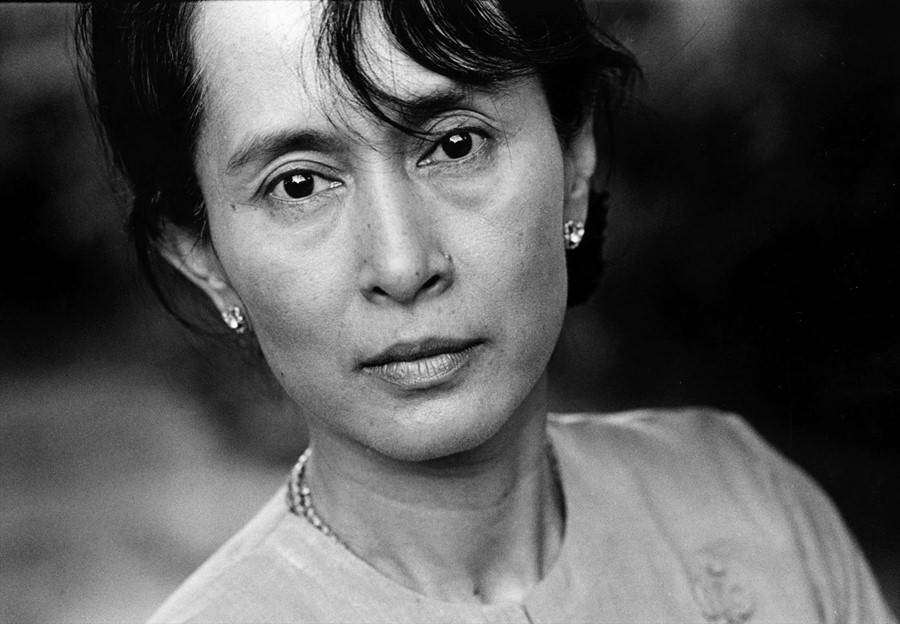For AnOther Magazine A/W11, Ed Caesar met Aung San Suu Kyi, the woman who has come to represent freedom and hope to the people of Burma and the world
The Burmese pro-democracy leader has become an international symbol of peaceful resistance. Eight months after her release from house arrest, Ed Caesar journeyed to Rangoon to meet her for a rare interview. He found the 66-year-old typically unruffled, and quietly determined.
Freedom means something different to Aung San Suu Kyi than it might to you or me. If – like Burma’s most famous dissident and democratic campaigner – you had been placed under house arrest for 15 of the last 21 years, would you consider yourself free? How about if, since your release last November, you had been reconnoitred constantly, and your travel circumscribed by the ruling military junta? Would this constitute true freedom? Your answer, I imagine, would be no.
Aung San Suu Kyi would politely disagree.
Another line of enquiry. Imagine that – during those periods of imprisonment in which you were powerless to influence anything but your personal routine – you had witnessed the government plunder your country’s natural resources for private and political gain, liquidate and imprison its political enemies, cleanse troublesome ethnic minorities, and forgo even the appearance of democracy. Would you have felt at liberty?
What about if your English husband had died of cancer without you by his side, because he was refused a visa, and you knew that if you returned to Britain to see him, you might never be allowed to return to Burma? Does it constitute freedom to choose between one’s family and one’s country? Your answers, I imagine, would be no, no, no.
Aung San Suu Kyi, again, would politely disagree.
“After I was released, people used to keep asking me, ‘what is it like to be free?’” she tells me, in her forthright, plummy English. “And it was very difficult for me to answer. I’d always felt free. As far as my state of mind was concerned, I didn’t feel any different... People ask me about what sacrifices I’ve made. I always answer: I’ve made no sacrifices, I’ve made choices. I don’t get angry. I wasn’t sacrificing myself for anybody. Really, it was a choice I made in accordance with what I believed.”
"People ask me about what sacrifices I’ve made. I always answer: I’ve made no sacrifices, I’ve made choices." — Aung San Suu Kyi
To most people, this attitude might seem inhumanly stoic. But Aung San Suu Kyi, plainly, is not most people.
There is a problem for the future of Burma. Its people – who seem polite, devout, quiescent, and gentle – have been bullied for so long that they may now be too cowed to effect change in their own country. The only real future these students see is overseas. None of them can imagine flourishing in Burma. Of course, this class was only a small study, but their sentiments were echoed by others I spoke to in Rangoon. Aung San Suu Kyi foresaw this problem three decades ago. After the 8888 uprising, she delivered a speech entitled Freedom from Fear, in which she argued “it is not power that corrupts, but fear. Fear of losing power corrupts those who wield it and fear of the scourge of power corrupts those who are subject to it.”
If her people are afraid, Aung San Suu Kyi is not. As she said in a famous speech, her hope for Burma’s future comes from “a firm belief in the sanctity of ethical principles combined with a historical sense that despite all setbacks the condition of man is set on an ultimate course for both spiritual and material advancement.” In this statement, you see the foundation of her sometimes frustratingly measured approach. Her cause is moral, or it is nothing. And she is driven by the belief that – to put it crudely – things will work out in the end.
Before I stand to say goodbye, she smiles and leaves me with a piece of advice. “I always say, you can only hope as much as you work. We work very hard, so we have the right to hope.” From anyone else, this would sound like fortune-cookie hokum. But from Aung San Suu Kyi, whose wisdom has been hard-won, it sounds like an article of faith.
For the full article, and for all 25 issues in the AnOther Magazine archive, visit Exact Editions.
